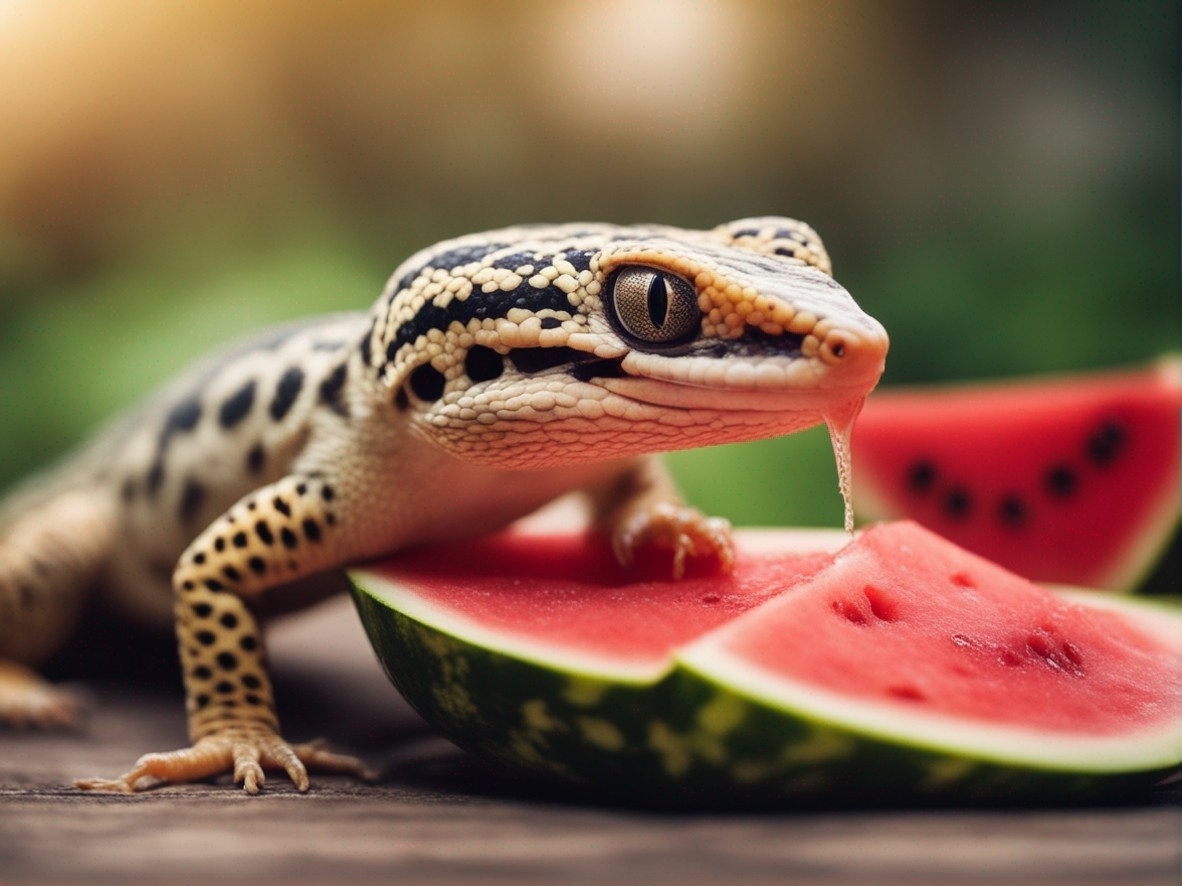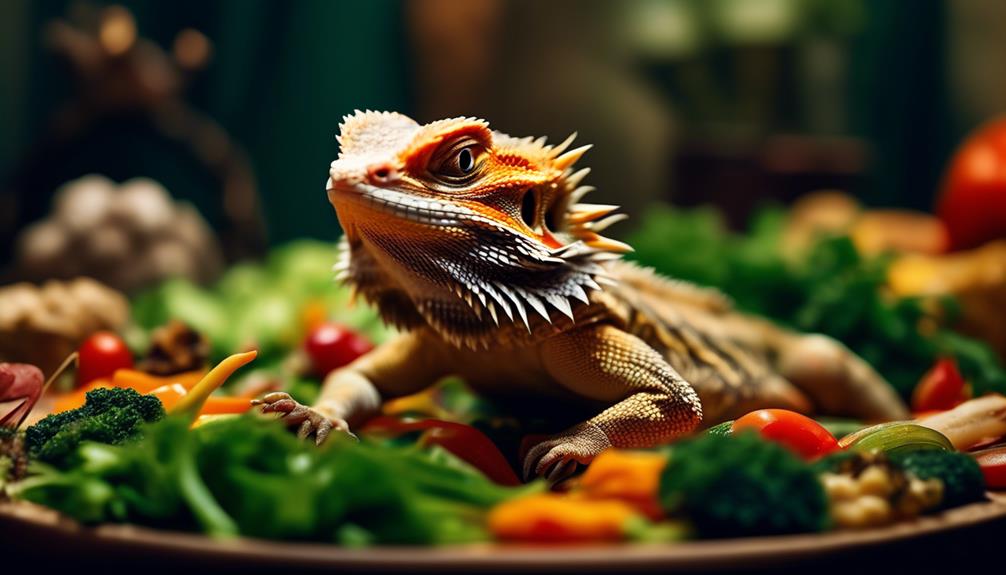Being a pet owner is like having your own little world. You’re responsible for providing everything your pet needs to live a happy, healthy life and that includes their diet. If you’re the proud owner of a crested gecko, you may be wondering if they can eat hornworms. It’s important to understand what hornworms are, the benefits and risks of feeding them to your crested gecko, how to feed them correctly, and tips on doing it safely. The journey ahead will help equip you with all the knowledge necessary to make an informed decision about whether or not to include hornworms in your crested gecko’s diet.
Key Takeaways
- Hornworms are high in calcium and protein, making them a nutritious food option for crested geckos.
- Feeding hornworms can provide enrichment and entertainment for crested geckos.
- While hornworms offer benefits, there are risks such as potential health issues from overfeeding or consuming parasites or bacteria.
- It is important to feed hornworms in moderation, monitor the gecko’s health, and provide a balanced diet with variety in order to ensure the gecko’s well-being.
What are Hornworms?
Hornworms are a type of caterpillar that’s fun to watch, and they make a tasty treat for your crested gecko! Breeding or buying hornworms is easy and worth the effort if you have a pet reptile. Hornworms grow quickly, which makes them an ideal meal for your crested gecko. They’re also high in calcium and protein, making them very nutritious for your pet’s diet. Hornworms also provide enrichment opportunities as they move around, providing entertainment to your gecko while they snack on these wriggly treats.
Hornworm pupae can be purchased from many online vendors or breeders who specialize in raising these caterpillars. When buying hornworms, make sure to purchase from a reputable source that follows proper care protocols throughout the breeding process. This will ensure the worms are healthy before feeding them to your gecko. Additionally, you should never feed wild-caught insects or larvae as this could contain harmful parasites or bacteria that could make your pet sick.
When introducing hornworms into your crested gecko’s diet, start with only one worm at first and observe how their body reacts to it before increasing the amount of worms given per feeding session over time. If any adverse reactions are observed such as vomiting or diarrhea then discontinue feeding hornworms immediately and consult with an exotic veterinarian if necessary.
Overall, hornworms offer numerous benefits when included in a crested gecko’s diet; however owners must take extra precautions when purchasing these wriggly creatures due to potential health concerns associated with wild-caught insects. With proper care and supplying nutritious food options like hornworm pupae, pet owners can rest assured knowing their beloved reptilian companion will be happy and healthy for years to come!
Benefits of Feeding Hornworms to Crested Geckos
Luxuriously plump and juicy, hornworms offer a tasty treat for your reptilian pet. Feeding them to crested geckos provides several benefits that help create a balanced diet. Hornworms are high in both calcium and fat, two important nutrients for reptiles. They have an impressive calcium-to-phosphorus ratio of 3:1, which helps ensure the proper absorption of minerals by your pet’s body. Additionally, they are packed with essential vitamins and fatty acids that can be difficult to obtain from other sources. Offering your crested gecko a variety of food is also important for their overall health; the addition of hornworms not only ensures nutrition but also helps keep their interest in eating alive!
By introducing hornworms into their diet, you will be taking advantage of the nutritional benefits these worms provide while helping diversify their menu options. This is especially critical when it comes to meeting dietary needs due to age or health issues — the importance of nutrition should never be underestimated. With this diversity comes added excitement as well; your crested gecko may look forward to mealtime more than ever before! However, there are still some risks associated with feeding these worms that must be taken into consideration before doing so.
Risks of Feeding Hornworms to Crested Geckos
Although hornworms offer a variety of nutritional benefits for your reptilian pet, it’s important to be aware of potential risks associated with feeding them. One major concern is dietary balance: Hornworms are high in calcium, but lack other minerals and vitamins found in more balanced diets. Too much calcium can lead to blocked intestinal tracts or even kidney failure. Additionally, hornworms may contain parasites or bacteria that could harm your crested gecko if ingested. If you decide to feed hornworms to your gecko, make sure they’re raised in a clean environment and that you purchase from reputable suppliers.
Another dietary concern is the risk of overfeeding since hornworms are very high in fat content compared to other insects. It’s important not to exceed the recommended number of worms per day; too many can cause digestive issues such as bloating and diarrhea. Also, if stored improperly, worms can become moldy and should not be served to your gecko under any circumstances.
It’s essential that any food given to your crested gecko provides a complete diet so they remain healthy and happy for years to come. To ensure this, monitor their eating habits carefully and provide a wide range of nutritious meals including fruits, vegetables, small insects, and commercially prepared reptile food mixes as part of an overall balanced diet plan. Properly managed nutrition is key for maintaining optimal health for your beloved pet! Moving forward with knowledge on how to feed hornworms properly will help keep everyone safe while also allowing them enjoy the many benefits these tasty treats have to offer.
How to Feed Hornworms to Crested Geckos
It’s important to feed your reptilian pet the right amount of hornworms in order to ensure a nutritious and balanced diet. With proper feeding techniques, you can provide your crestie with the nutrition they need while minimizing any risks associated with providing them with this type of food. To begin, you’ll want to start out by introducing small amounts of hornworms into their diet slowly over time. This will give them time to adjust and also allow you to monitor their reaction or appetite for the new food item.
Monitoring their intake is also essential when feeding them hornworms as too much can lead to digestive issues or other health concerns. Start by offering just a few worms at a time, no more than 10-15 per feeding session depending on your crested gecko’s size and age. You’ll also want to be sure that all worms are fed fresh and alive rather than frozen or dead as frozen worms may contain parasites which could harm your gecko if consumed. Finally, it’s important that you provide a variety of other insect proteins along with hornworms so that they receive an adequate amount of nutrition from different sources.
By following these guidelines when it comes to feeding hornworms to your crested gecko, you can ensure that they are receiving the necessary nutrients while avoiding any potential risks related to overfeeding or consumption of unhealthy insects. Going forward, it’s important that you continue monitoring their appetites and adjusting the quantity according as needed in order for them to stay healthy and happy!
Tips for Feeding Hornworms to Crested Geckos
Feeding hornworms to your crested gecko is a great way to provide variety in their diet, but it is important to keep an eye on your gecko’s health. Make sure you feed them in moderation and monitor for any signs of illness such as decreased activity or appetite. This will help ensure that they are getting all the nutrients they need while also enjoying a tasty treat!
Provide variety in diet
Providing variety in your crested gecko’s diet is essential, as it helps them get the nutrients they need to stay healthy and happy. To do so, consider incorporating alternative diets into their meal planning, such as:
- Fruits
- Vegetables
- Insects
You should also explore commercial diet options that contain a wide variety of ingredients. This will ensure your gecko gets all the vitamins and minerals they need for optimal health. As you feed your crested gecko regularly, be sure to monitor their health and look out for any signs of distress or nutrient deficiencies. Doing so will help ensure that your gecko has access to a balanced diet full of the right nutrients. With the right approach, you’ll have a happy and healthy crested gecko for years to come!
Monitor gecko’s health
Staying vigilant and monitoring your gecko’s health is key to its long-term wellbeing. Track your gecko’s diet, as it will reveal important information about their overall health. Pay attention to the amount of food they are eating, as well as the types of food they prefer. If there is an imbalance in their diet, you may need to adjust what you are giving them. Also, track any changes in their size or weight over time so that you can identify any potential problems early on. Monitoring your gecko’s diet and growth will help ensure your pet stays healthy and happy for years to come.
Frequently Asked Questions
What size of hornworms should I feed to my crested gecko?
Wow! You’ll be amazed at how much your crestie loves hornworms – they’re like a treat they can’t get enough of! When feeding, make sure to offer only small-sized worms, and no more than twice a week. Also remember to gut load them beforehand for optimal nutrition. A little bit of hornworm goes a long way in providing your gecko with essential nutrients.
How often should I feed hornworms to my crested gecko?
When meal planning for your crested gecko, it’s important to feed them hornworms no more than once every two weeks. Make sure to gut-load the insects before feeding to ensure proper nutrition. With this method, you can provide a healthy diet that meets their needs.
Where can I find hornworms to purchase for my crested gecko?
You can purchase hornworms online from various sources. On average, they should be fed to your crested gecko according to a weekly feeding schedule and gut-loaded with calcium supplements. With the right diet, hornworms will provide a nutritious meal for your pet reptile while being easy to order and store.
How do I know if my crested gecko likes hornworms?
You can tell if your crested gecko likes hornworms by doing a taste test. Observe for any behavioral changes or signs of enjoyment when offered the food. If they seem to enjoy it, then you know they like it!
Are there other insects I can feed to my crested gecko in addition to hornworms?
Discover the variety of alternative insects that your crested gecko can enjoy as part of their feeding schedule. From mealworms to waxworms, you’ll be amazed at how much they appreciate the diversity in flavor. Knowledgeable and experienced, let’s provide your pet with a nutritional diet that serves them well.
Conclusion
You’ve now learned that hornworms can be a great addition to your crested gecko’s diet. Be sure to follow the guidelines and tips for feeding them, and you’ll have a happy, healthy pet. Just remember: with great power comes great responsibility. Feeding hornworms is an act of trust between you and your pet, so if you’re going to do it, take it seriously. Your crested gecko will thank you for it in the long run!

